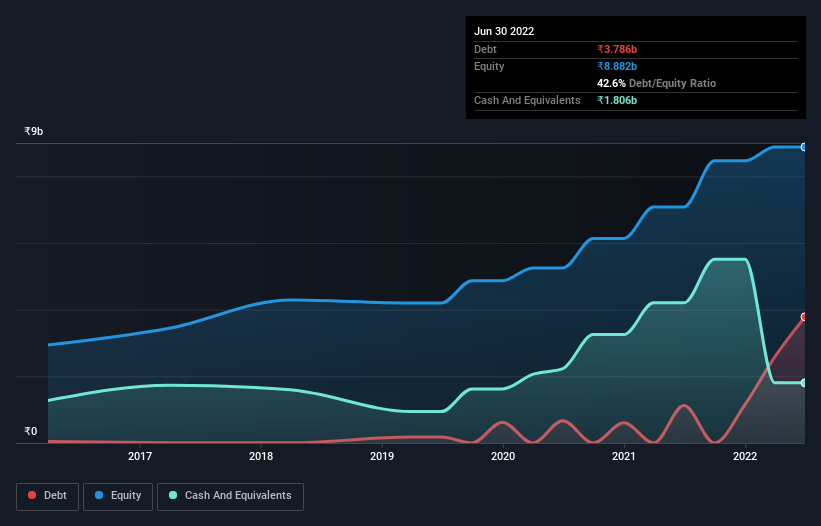- India
- /
- Healthcare Services
- /
- NSEI:METROPOLIS
Is Metropolis Healthcare (NSE:METROPOLIS) A Risky Investment?

David Iben put it well when he said, 'Volatility is not a risk we care about. What we care about is avoiding the permanent loss of capital.' It's only natural to consider a company's balance sheet when you examine how risky it is, since debt is often involved when a business collapses. We note that Metropolis Healthcare Limited (NSE:METROPOLIS) does have debt on its balance sheet. But the more important question is: how much risk is that debt creating?
Why Does Debt Bring Risk?
Debt assists a business until the business has trouble paying it off, either with new capital or with free cash flow. Part and parcel of capitalism is the process of 'creative destruction' where failed businesses are mercilessly liquidated by their bankers. However, a more common (but still painful) scenario is that it has to raise new equity capital at a low price, thus permanently diluting shareholders. Having said that, the most common situation is where a company manages its debt reasonably well - and to its own advantage. The first thing to do when considering how much debt a business uses is to look at its cash and debt together.
Check out our latest analysis for Metropolis Healthcare
What Is Metropolis Healthcare's Net Debt?
As you can see below, at the end of March 2022, Metropolis Healthcare had ₹3.79b of debt, up from ₹1.12b a year ago. Click the image for more detail. However, it also had ₹1.81b in cash, and so its net debt is ₹1.98b.

How Strong Is Metropolis Healthcare's Balance Sheet?
Zooming in on the latest balance sheet data, we can see that Metropolis Healthcare had liabilities of ₹3.02b due within 12 months and liabilities of ₹3.41b due beyond that. On the other hand, it had cash of ₹1.81b and ₹1.42b worth of receivables due within a year. So its liabilities total ₹3.20b more than the combination of its cash and short-term receivables.
Of course, Metropolis Healthcare has a market capitalization of ₹76.0b, so these liabilities are probably manageable. But there are sufficient liabilities that we would certainly recommend shareholders continue to monitor the balance sheet, going forward.
We use two main ratios to inform us about debt levels relative to earnings. The first is net debt divided by earnings before interest, tax, depreciation, and amortization (EBITDA), while the second is how many times its earnings before interest and tax (EBIT) covers its interest expense (or its interest cover, for short). Thus we consider debt relative to earnings both with and without depreciation and amortization expenses.
Metropolis Healthcare has a low net debt to EBITDA ratio of only 0.74. And its EBIT covers its interest expense a whopping 23.1 times over. So you could argue it is no more threatened by its debt than an elephant is by a mouse. In fact Metropolis Healthcare's saving grace is its low debt levels, because its EBIT has tanked 27% in the last twelve months. When a company sees its earnings tank, it can sometimes find its relationships with its lenders turn sour. The balance sheet is clearly the area to focus on when you are analysing debt. But ultimately the future profitability of the business will decide if Metropolis Healthcare can strengthen its balance sheet over time. So if you're focused on the future you can check out this free report showing analyst profit forecasts.
But our final consideration is also important, because a company cannot pay debt with paper profits; it needs cold hard cash. So it's worth checking how much of that EBIT is backed by free cash flow. During the last three years, Metropolis Healthcare generated free cash flow amounting to a very robust 91% of its EBIT, more than we'd expect. That puts it in a very strong position to pay down debt.
Our View
Happily, Metropolis Healthcare's impressive interest cover implies it has the upper hand on its debt. But we must concede we find its EBIT growth rate has the opposite effect. We would also note that Healthcare industry companies like Metropolis Healthcare commonly do use debt without problems. When we consider the range of factors above, it looks like Metropolis Healthcare is pretty sensible with its use of debt. While that brings some risk, it can also enhance returns for shareholders. There's no doubt that we learn most about debt from the balance sheet. But ultimately, every company can contain risks that exist outside of the balance sheet. For instance, we've identified 2 warning signs for Metropolis Healthcare that you should be aware of.
If you're interested in investing in businesses that can grow profits without the burden of debt, then check out this free list of growing businesses that have net cash on the balance sheet.
New: Manage All Your Stock Portfolios in One Place
We've created the ultimate portfolio companion for stock investors, and it's free.
• Connect an unlimited number of Portfolios and see your total in one currency
• Be alerted to new Warning Signs or Risks via email or mobile
• Track the Fair Value of your stocks
Have feedback on this article? Concerned about the content? Get in touch with us directly. Alternatively, email editorial-team (at) simplywallst.com.
This article by Simply Wall St is general in nature. We provide commentary based on historical data and analyst forecasts only using an unbiased methodology and our articles are not intended to be financial advice. It does not constitute a recommendation to buy or sell any stock, and does not take account of your objectives, or your financial situation. We aim to bring you long-term focused analysis driven by fundamental data. Note that our analysis may not factor in the latest price-sensitive company announcements or qualitative material. Simply Wall St has no position in any stocks mentioned.
About NSEI:METROPOLIS
Metropolis Healthcare
Provides diagnostic services in India and internationally.
Excellent balance sheet with reasonable growth potential.
Similar Companies
Market Insights
Community Narratives



